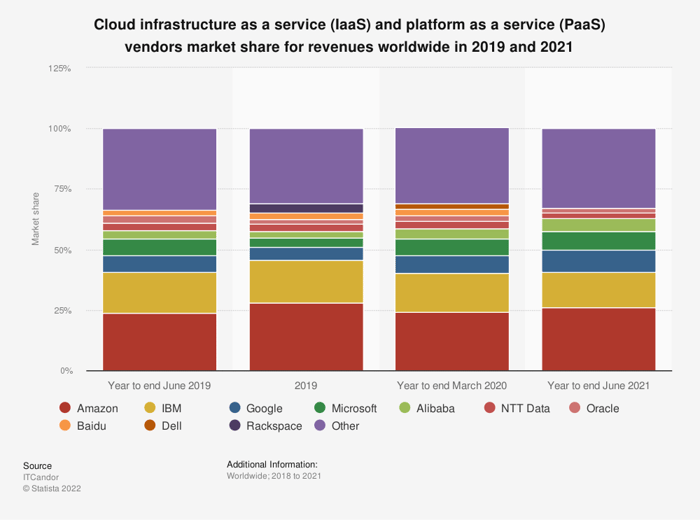Cloud computing remains a fragmented industry with multiple players. While much of the overall attention seems to focus on big players like Amazon Web Services and Microsoft's Azure, numerous other companies have built successful niches in this growing tech sector.
For instance, two segments within the cloud sector -- infrastructure-as-a-service (IaaS) and platform-as-a-service (PaaS) -- have seen the vendor market share concentrate with longtime tech giant International Business Machines (IBM -8.25%). Let's take a closer look at how IBM is showing surprising strength in the cloud and what it could mean for investors.

Image source: Getty Images.
IBM's place in the cloud
According to market research firm ITCandor, IBM made up about 15% of vendor revenue share in 2021. Though that still lags Amazon at 26%, it leads competitors such as Microsoft, Alphabet's Google Cloud, and Alibaba.

Image source: Statista
Under Arvind Krishna, who took the CEO job two years ago, IBM has built on its acquisition of Red Hat and spun off the infrastructure services part of the company into a separate entity that now operates as Kyndryl.
These moves have helped IBM become much more of a cloud company focused especially on the hybrid cloud, a product that allows public and private clouds to communicate with one another. Its hybrid cloud revenue grew 20% in 2021 and accounted for just over one-third of IBM's overall revenue. This emphasis has also made it the world's fifth-largest infrastructure cloud player, even when considering exclusively infrastructure-related revenue.

Image source: Statista
Don't forget the financials
The market may not fully appreciate IBM's cloud opportunity. After years of negligible revenue growth, revenue increased 7% in Q4, the quarter when the Kyndryl spinoff took place. Moreover, the company forecasts mid-single-digit growth going forward and $35 billion in free cash flow in the three-year period between 2022 and 2024. This should finance the dividend, which cost the company $5.9 billion in 2021.
This dividend pays shareholders $6.56 per share annually, a cash yield of 5% at current prices. Additionally, since it is a Dividend Aristocrat, IBM will likely choose to increase its dividend every year to hold on to that status, making it a safe bet regardless of market conditions.
IBM stock sells at a P/E ratio of about 21, which suggests it's trading at a discount to the market average and much lower than many tech stocks. This is likely due to the lackluster revenue and stock performance over the past decade. However, with revenue growth increasing and a significant growth obstacle removed, IBM's fortunes could experience a long-awaited turnaround.
Is cloud strength a reason to consider IBM?
Despite its substantial cloud revenue share, IBM has just begun to benefit from its image as a cloud company. It has gained increased recognition in the cloud industry and has long accounted for a considerable share of the vendor revenue in IaaS and PaaS. With a relatively low earnings multiple and a generous, rising dividend, IBM could become the cloud stock of choice for income and possibly growth-oriented investors.





